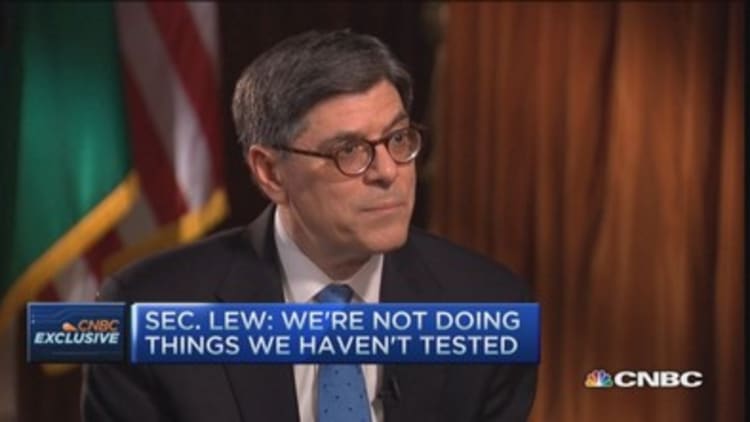The U.S. economy has turned the corner, with sustainable growth in business activity and jobs, said Treasury Secretary Jack Lew.
"We're getting some benefit now from oil prices in terms of the economy getting a bit of a boost on top of that. So I'm feeling pretty confident that we're looking at a good period ahead," Lew said in an exclusive interview that aired on CNBC's "Squawk Box" on Monday.
One area where Lew would like to see further increases is in wages, despite a 12 cents an hour move higher in January's better-than-expected employment report—that represented the largest monthly gain in the economic recovery and an annualized growth rate of 2.2 percent. "We need more wage growth that people can really feel," he said.
Strong upward revisions in November and December pushed average job creation to 336,000 for the past three months, according to Friday's report from the U.S. Labor Department.
Read MoreBetter news than expected for January jobs
Overall economic activity has not been as robust. Growth estimates for the first quarter were converging around a 2.5 percent pace after the Commerce Department reported last month a weaker-than-expected 2.6 percent growth rate for the fourth quarter.
But Lew remained optimistic: "We're seeing a comeback in manufacturing, now we're seeing housing and construction come back. And we've seen the deficit go way down, all at a time when we have people who are now finding the security of having health care coverage that they didn't have before."
Lew also brushed off Republican critics who said President Barack Obama's near $4 trillion budget, which included a proposal for an increase in capital gains and dividend taxes from the current 23.8 percent, would hurt growth. "The 28 percent capital gains rate was the rate that was in effect when President Reagan was in office, and the economy did just fine at that time with that rate," he said.

As for the strong dollar, which has hurt many American multinational companies this earnings season, Lew said recent currency moves reflect the strength of the U.S. economy compared to the rest of the world. "In a relative basis it's stronger than a lot of the economies that we compete with," he said. "The real challenge is getting other economies to get back in the growth pattern where they're doing better."
Lew added that economic growth would be a topic of conversation at this week's two-day meeting of G-20 finance ministers and central bank governors, starting Monday in Istanbul, Turkey.
One of the ways Lew suggested for boosting the economies in Europe would be to resolve the Greek debt standoff with a "practical, pragmatic path forward."
Resolving the Greek crisis may prove difficult after leftist Prime Minister Alexis Tsipras laid out plans on Sunday to dismantle his country's "cruel" austerity program, ruling out any extension of its international bailout and setting himself on a collision course with his European partners.
Read MoreG-20 chiefs plea for 'cooler heads' in Greek crisis
"Greece has made a lot of sacrifices and changes in its own economy over these last few years. There's a stronger foundation than there was, and they need to build on that strong foundation to come up with mutually agreeable terms going forward," Lew said.
Meanwhile, getting Russia to back off in Ukraine would also bring a more stabilized environment to Europe, he said.
"The sanctions are working in the sense that they've had a tremendous impact on the Russian economy. The Russian economy is not good. Some of it is oil price coming down. Some of it is the sanctions have really weakened the core of Russia's economy," Lew said.
Russian President Vladimir Putin needs to work with the international community if he wants the sanctions to be rolled back, Lew said, adding the U.S. is prepared to ratchet the punitive measures up or down.
"Our preference would be to ratchet them down because that would be the best thing for the economy in Europe and the best thing for stability," he said, "but that would require Russia living by its commitments and pulling back and honoring the sovereignty of Ukraine."
Read MoreRussian assets rise on hopes of Ukraine solution
In a glimmer of hope, the leaders of Russia, Ukraine, Germany, and France have agreed to meet in Belarus on Wednesday to try to broker a peace deal.
Meanwhile, President Barack Obama is set to meet with German Chancellor Angela Merkel Monday, trying for a public display of unity despite a potential split over arming Ukrainian fighters to wage a more effective battle against Russian-backed separatists.
—Wire services contributed to this report.
--This story has been updated to clarify that economic growth will be discussed at the upcoming G-20 meeting.


